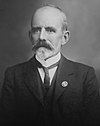| |||||||||||||||||||||||||||||||||||
| Turnout | 4,719 (51.43%) | ||||||||||||||||||||||||||||||||||
|---|---|---|---|---|---|---|---|---|---|---|---|---|---|---|---|---|---|---|---|---|---|---|---|---|---|---|---|---|---|---|---|---|---|---|---|
| |||||||||||||||||||||||||||||||||||
| |||||||||||||||||||||||||||||||||||
The Wellington Central by-election of 1918 was a by-election held in the Wellington Central electorate during the 19th New Zealand Parliament, on 3 October 1918. It was caused by the death of incumbent MP Robert Fletcher of the Liberal Party and was won by Peter Fraser with a majority of 1,624.
Candidates
Coalition government
The Wartime Coalition government between the Reform Party and Liberal Party sought to retain the seat, though were anxious of their chances of retaining an urban electorate following their narrow win in the Wellington North by-election several months earlier. Under the terms of the coalition agreement between Reform and the Liberal's a condition was made not to oppose each other in by-elections for deceased or retiring MP's from their own parties. Several candidates were approached for the Liberal nomination and eventually William Hildreth, a Wellington City Councillor was selected and endorsed by acting-Prime Minister James Allen. [1]
Labour Party
The Labour Party had supported Robert Fletcher (a left winger amongst the Liberals) in the 1911 and 1914 elections, but decided to contest the election for his vacated seat themselves. Labour were confident following a near victory in the Wellington North by-election earlier in the year. There were three contestants for the Labour Party nomination Peter Fraser, John Read and Michael Reardon. [2] Fraser was selected as the official Labour candidate and had a large local following. Fraser had gained much notability after spending one year in jail for sedition after speaking out against the war and conscription. Even on his release he was still a prominent critic of the government. [3]
Others
Joe Mack stood as an independent Labour candidate. He was a moderate amongst the union movement and unlike most others he supported both the war effort and conscription. To many observers, Mack represented "sane Labour" due to his distance from the radical views held by many socialists at the time. His candidature was put forward by the Protestant Political Association of New Zealand claiming him to be a patriotic individual and not a " Bolshevik" like many of his union colleagues. [4]
Previous election
| Party | Candidate | Votes | % | ±% | |
|---|---|---|---|---|---|
| Liberal | Robert Fletcher | 5,208 | 64.40 | ||
| Reform | Francis Fisher | 2,879 | 35.60 | ||
| Majority | 2,329 | 28.80 | |||
| Informal votes | 84 | 1.03 | |||
| Turnout | 8,171 | 84.47 | |||
| Registered electors | 9,673 | ||||
| Liberal gain from Reform | Swing | ||||
Results
The following table gives the election results:
| Party | Candidate | Votes | % | ±% | |
|---|---|---|---|---|---|
| Labour | Peter Fraser | 2,668 | 56.54 | ||
| Independent Labour | Joe Mack | 1,044 | 22.12 | ||
| Liberal | William Hildreth | 784 | 16.61 | ||
| Independent | Harry Atmore | 185 | 3.92 | ||
| Independent | Lindsay John Frederick Garmston | 29 | 0.61 | ||
| Independent | William Cyril Tanner | 9 | 0.19 | ||
| Majority | 1,624 | 34.41 | |||
| Turnout | 4,719 | 51.43 | -33.04 | ||
| Registered electors | 9,176 | ||||
| Labour gain from Liberal | Swing | ||||
Notes
- ^ Gustafson 1980.
- ^ "Wellington Central by-election". The Press. Vol. LIV, no. 16317. 14 September 1918. p. 9. Retrieved 1 July 2018.
- ^ Beaglehole, Tim. "Fraser, Peter". Dictionary of New Zealand Biography. Ministry for Culture and Heritage. Retrieved 11 December 2011.
- ^ Atkinson, Neill. "Matthew Joseph Mack". Dictionary of New Zealand Biography. Ministry for Culture and Heritage. Retrieved 26 December 2016.
- ^ The General Election, 1914. Government Printer. 1915. p. 3. Retrieved 15 March 2014.
- ^ "A victory for Labour". The Evening Post. Vol. XCVI, no. 83. 4 October 1918. p. 3. Retrieved 15 March 2014.
References
- Gustafson, Barry (1980). Labour's path to political independence: The Origins and Establishment of the New Zealand Labour Party, 1900–19. Auckland, New Zealand: Auckland University Press. ISBN 0-19-647986-X.



